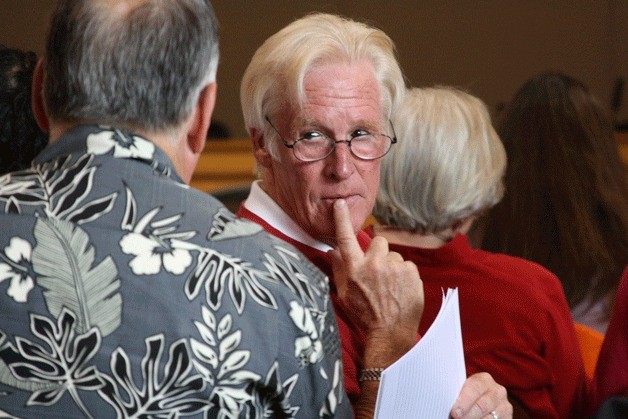It was the same old tune, but for a different audience.
Waterfront homeowners and more weighed in on the city’s Shoreline Master Program update, Wednesday evening.
This time, however, officials with the Department of Ecology were present and listening. For the first time, the update was out of the city’s hands and under review by state decision-makers.
Islanders were there to give them an earful.
Ecology will ultimately approve or deny the update, or possibly return it to the city requiring changes be made.
If the update as discussed under the council’s purview was the original series, then Ecology’s public hearing was the remake; comprised of all the same material as before, with a few new bells and whistles.
Beginning at 6 p.m. with an open house, islanders filled the council chambers and poured out its doorway onto the patio. But by the end of the meeting, closing in on 11 p.m., only a handful remained.
As expected, islanders drew a line down the issue.
On one side were those claiming that Bainbridge Island’s Shoreline Master Program was too restrictive and encroached on property owners’ rights. On the other side were those that felt the update didn’t go far enough and should do more to protect the Puget Sound from shoreline development.
Familiar arguments on the update volleyed back and forth, from nonconforming designations to buffer zone objections.
Many said the update was too vague and confusing.
“This SMP is contentious because it significantly affects property rights,” said Dick Haugan, a candidate for the city council.
“This complex SMP, focused on the shoreline, is very difficult to understand and in fact impractical to enforce,” he said. “It is certain to be legally challenged, and Bainbridge has a poor track record in the litigation department.”
The legality was the chief argument posed by shoreliners Wednesday, but that wasn’t all. Some said that agenda-driven politics were at play.
Tom Gollon implied that “ecofascists” — referencing a book of the same name — had influenced the update.
“We had study groups here set up so that they would conveniently always rule in favor of the more stringent rules,” he said.
Andrew Lister admitted he was new to the island and the issue, but as a shoreline homeowner, he was concerned about what he was hearing.
“It seems like there is an attempt to take away a few of my rights and my financial interests,” Lister said.
“I suggest that maybe the shoreline homeowners should get together and consider seceding from the city of Bainbridge Island and rejoining Kitsap County,” he said.
But not everybody agreed that the city’s update was a threat.
“The goal of no net loss uses today’s degraded condition of Puget Sound as a baseline,” said Marcia Lagerloef. “And that falls far short of the measures we need to restore a healthy Puget Sound.”
“I have some concerns about the small size of Buffer Zone 1,” she added. “Coupled with the ability to remove trees, clear areas for views and expand the building footprint by 25 percent — I don’t think that is adequately protective of the shoreline habitat.”
Lagerloef wasn’t alone.
“I’m really concerned about the buffers,” said Lisa Macchio. “I’m willing to accept what we have, but I think it’s a large compromise.”
“It is clear to me that a lot of policy was injected into something that should have been science-based.”
Theo Fehsenfeld, a college student and member of Futurewise, also supported the update.
“The Puget Sound is declining in health. We need to protect its water quality and wildlife for my generation and future generations,” Fehsenfeld said.
“Ten Puget Sound species have been listed as threatened or endangered by state and federal government,” she added. “Another 33 marine species are identified as species of concern.”
Others noted that the arguments have become so extreme that many are confused about what the program will actually do.
“Unfortunately there has been a great deal of misleading information which has marred this process for the community,” said Frank Stovall. “Some have been so loudly exaggerated and unsubstantiated that it has needlessly scared people. (It has) become so polarized, what could have been a reasonable discussion, now people cannot see or hear straight when it comes to the SMP.”
Ecology can accept the proposed update, ask for changes or reject it altogether.
Barbara Nightingale, an Ecology official who is the project manager for the Bainbridge update, said most updated programs require a bit of work from the city or county that put it together.
“‘Deny’ rarely happens,” she told the crowd.
Ecology officials said that the department doesn’t expect to have its review of the island’s update finished before October.



